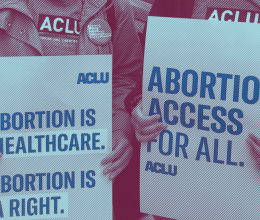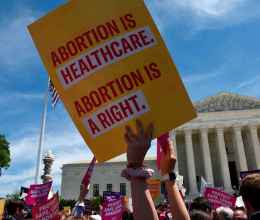
Decision Decimates Access to Safe, Legal Abortion
FOR IMMEDIATE RELEASE
CONTACTS: Erin White, ACLU National, [email protected]
Tom Hargis, ACLU of Texas, 773.484.7871 (mobile), [email protected]
HOUSTON — A federal appeals court in New Orleans issued a ruling today that will decimate abortion access across Texas by forcing most of the state’s abortion clinics to close.
The decision upholds a Texas law that requires medically unnecessary and prohibitively costly renovations to women’s health centers. The law was challenged by the Center for Reproductive Rights.
Today’s decision leaves all but seven clinics at risk of closure for the state’s more than 5.5 million women of reproductive age. Some parts of the state, which is almost as large as Indiana, Ohio, West Virginia, Kentucky, Tennessee, North Carolina and South Carolina combined, are left with essentially no access to abortion.
“Today, these judges favored politics over Texas women and families,” said Terri Burke, executive director of the ACLU of Texas. "The law does nothing to protect women’s health, which is the way it was shamefully sold to the public by Texas legislators. Instead, it severely limits women’s medical options."
Legislators who authored and voted for the law claimed to promote women’s safety, while acknowledging it was actually created to close abortion clinics.
“My heart breaks for the women and families of Texas,” said Jennifer Dalven, director of the ACLU’s Reproductive Freedom Project. “This law was designed for one purpose: to keep a woman who has decided to get an abortion from getting one. It’s bad medicine, created by politicians and not doctors, and it’s deeply disappointing that the court has chosen to ignore women in favor of political maneuvering.”
Major medical groups, including the Texas Medical Association and the American Congress of Obstetricians and Gynecologists, oppose the requirements, which dictate everything from the size of closets to even the color of paint on the wall, because they have little to do with patient health. The requirements are designed to force women’s health providers to close, and they are succeeding.
Abortion was already difficult for many women to access in Texas, with some women having to drive more than 200 miles to get an abortion.
“Decades ago, the US Supreme Court recognized that the US Constitution guarantees women access to safe, legal abortions; that's a settled matter,” said Mark S. DeFrancesco, MD, president of the American Congress of Obstetricians and Gynecologists. “Thanks to good medical care, abortion is one of the safest procedures. Under the guise of making abortion safer, these requirements actually make abortion less safe and will prevent women from getting the abortions they need. Even procedures with higher complication and mortality rates don't have to meet these specious standards. Women deserve better from their elected representatives, who should be protecting – not working to take away – their Constitutional rights."
Last year, the Supreme Court put on hold an earlier ruling that would have closed most of the state’s clinics, allowing clinics across the state to remain open while the federal court considered its decision.
This law is one of hundreds of abortion restrictions that have been introduced by state legislatures with the goal of restricting access to abortion. In the first quarter of 2015 alone, more than 330 abortion restrictions were introduced in 43 states. These restrictions have severely blocked access across the South – today’s ruling makes it yet more difficult.
New polling shows that most Americans identify as pro-choice and that seven in 10 Americans want a woman who has decided to have an abortion to be able to get it without additional burdens.






